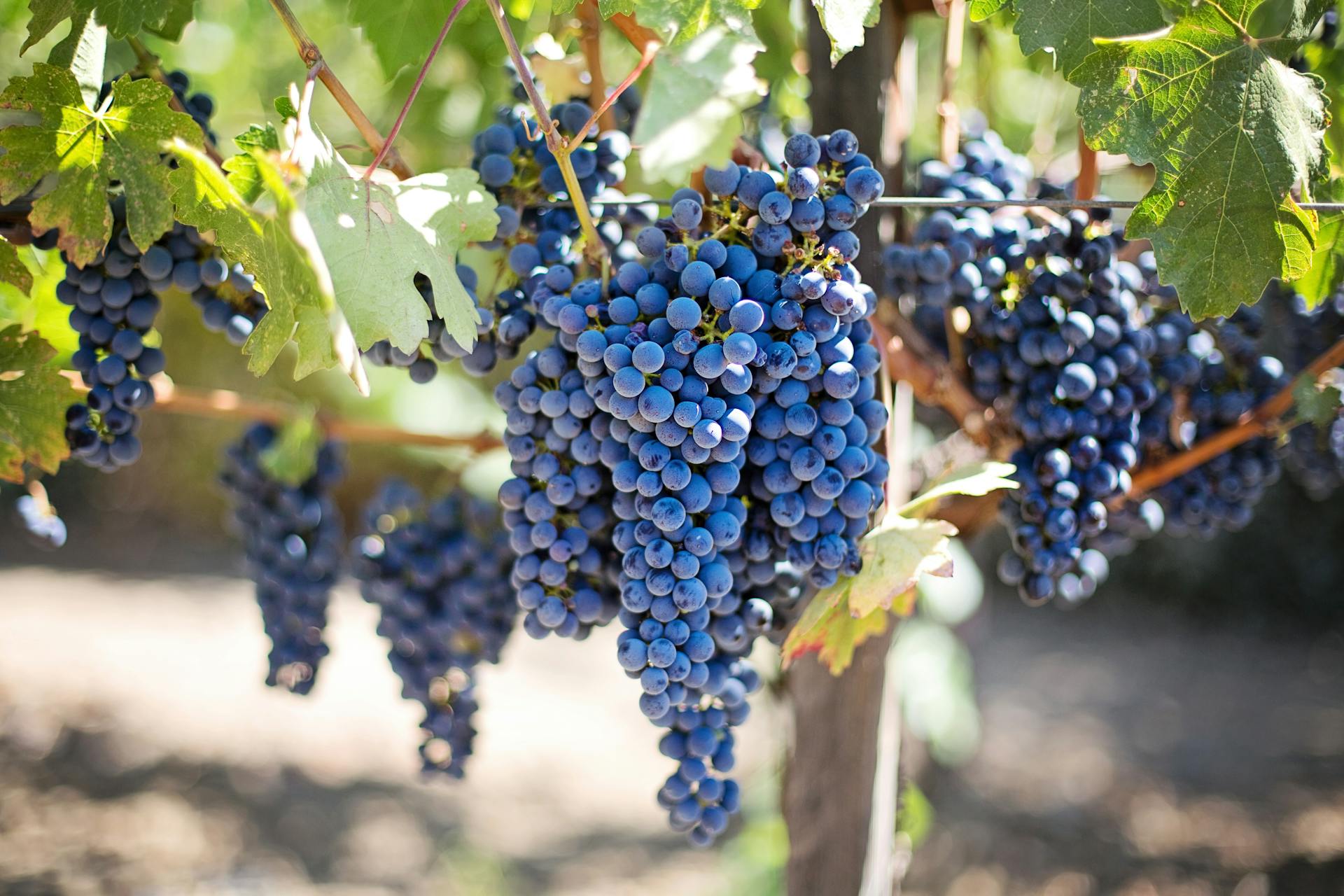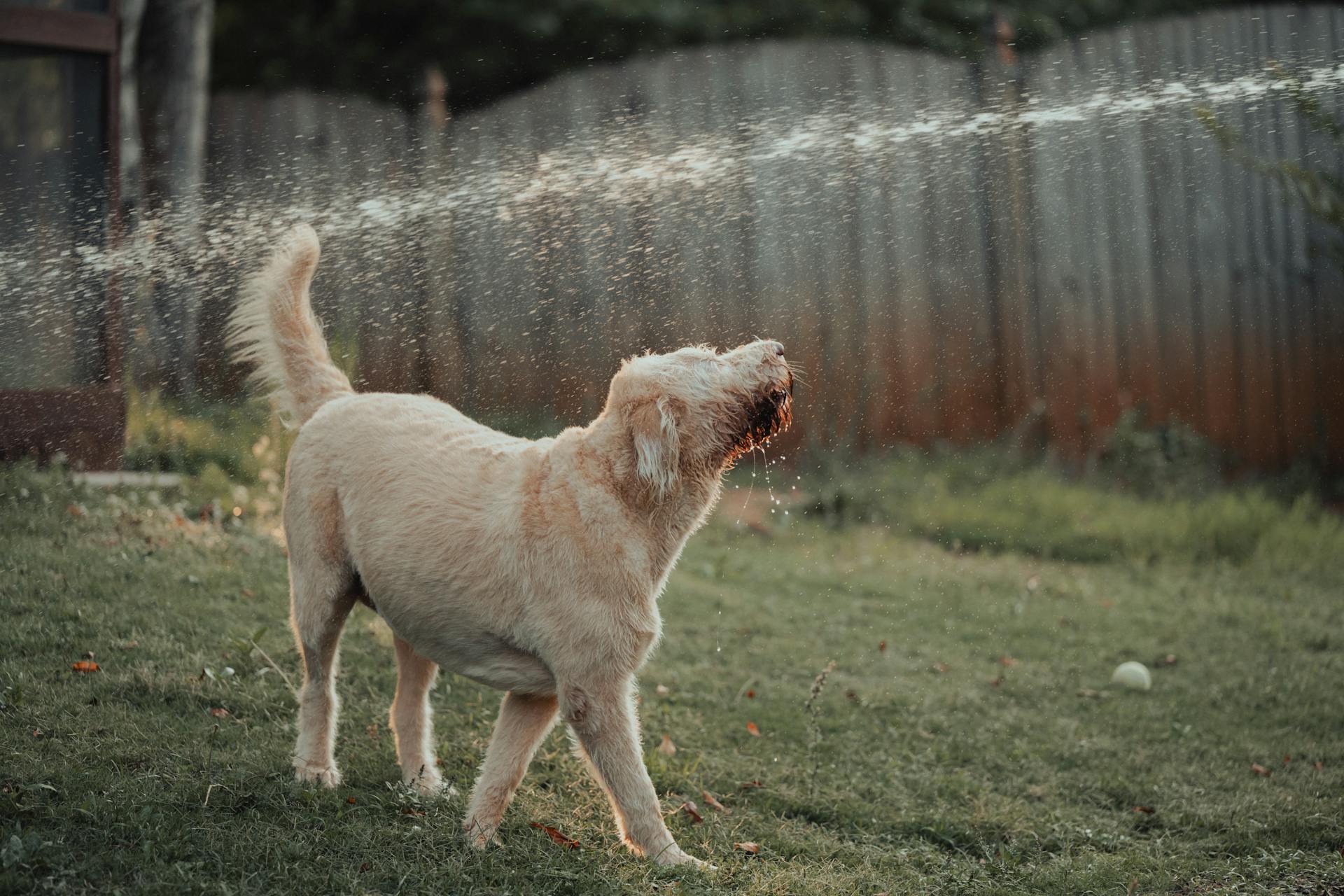
Grape toxicity in dogs is a serious concern that requires immediate attention.
Grapes, raisins, and currants are toxic to dogs, even in small amounts.
The exact mechanism of grape toxicity is still unknown, but it's believed to cause kidney failure.
Symptoms of grape toxicity can appear within 24 hours of consumption and may include vomiting, diarrhea, lethargy, and abdominal pain.
A fresh viewpoint: Grape Flavored Benadryl
Causes and Types
Grape toxicity in dogs is a serious issue that can arise from various sources. Dogs can become poisoned by ingesting grapes or raisins, regardless of whether they're seedless or seeded, commercial or homegrown, red or green.
Some common risk factors associated with grape poisoning include owner feeding the dog foods that contain grapes, leaving grapes out in a fruit bowl, and having open containers of trail mix with raisins. Spoiled grapes thrown in the garbage and grapes or currants growing in the garden can also be a hazard.
Here are some potential sources of grape poisoning:
- Owner feeding the dog foods that contain grapes
- Grapes left out in a fruit bowl
- Open container of trail mix with raisins
- Spoiled grapes thrown in the garbage
- Grapes or currants growing in the garden
- Wild grapes
What Types Are?
Grape varieties that are toxic to dogs include seedless and seeded grapes, as well as commercial and homegrown fruits.

Red and green grapes, as well as raisins, have been known to cause poisoning in dogs.
Organic and non-organic grapes and raisins can be just as toxic, so it's essential to keep an eye on your furry friend's snacks.
Foods containing grapes, raisins, and currants, such as raisin bran cereal, trail mix, and granola mix, are all potential sources of poison.
Some dogs may be more sensitive to the toxic effects of grapes and raisins, so it's impossible to predict which ones will be affected.
A fresh viewpoint: Dogs Eating Grapes
Difference Between Raisins and Currants
Raisins, grapes, and currants are all toxic, but the reason why is still unknown.
Some researchers suspect that a mycotoxin, a toxic substance produced by a fungus or mold, may be the cause of toxicity in these fruits.
The toxicity of these fruits is a cause for concern, and exposure to them should be avoided.
Raisins and currants are often used in cooking and baking, but it's essential to be aware of the potential risks associated with consuming them.
Grapes, on the other hand, are a common ingredient in many foods and beverages, but their toxicity is still not fully understood.
It's worth noting that no toxic agent has been identified in these fruits, which makes it even more puzzling why they are toxic in the first place.
Worth a look: Salt Water Toxicity in Dogs
Pathogenesis of Raisin and Tamarind Fruits
Grapes, raisins, and tamarinds belong to the Vitis and Tamarindus genera, respectively. These fruits are occasionally associated with renal failure in dogs.

The toxic principle in these fruits is thought to be tartaric acid, an organic acid present in high concentrations. Dogs poorly excrete organic acids because they lack the necessary transporters.
Tartaric acid accumulates in the proximal renal tubular cells of dogs, leading to renal failure. Affected dogs typically develop oliguric or anuric renal failure within 72 hours of ingesting these fruits.
The tartaric acid content of grapes, raisins, and tamarinds varies, resulting in variable effects following ingestion. More than one grape or raisin per 4.5 kg (10 pounds) of body weight may contain enough tartaric acid to pose a risk for renal effects in dogs.
Worth a look: Lyme Disease Vaccination for Dogs Side Effects
Symptoms and Diagnosis
If your dog has ingested grapes or raisins, it's essential to recognize the symptoms quickly. Vomiting is often the first sign, seen within 24 hours after ingestion.
The symptoms can progress rapidly, and it's crucial to get veterinary treatment as soon as possible. Lack of appetite, lethargy, and diarrhea can also be seen within 12-24 hours.
Related reading: Symptoms of Dogs Eating Grapes
A variety of symptoms are possible, including vomiting and/or diarrhea, hyperactivity, depression, and lethargy. Abdominal pain, fluid cessation, and loss of appetite are also common.
The symptoms can be similar to kidney failure from other causes, making diagnosis challenging. However, the presence of pieces of grapes or raisins in the vomit or feces can be a strong indication of grape toxicity.
A history of grape ingestion, signs, and blood tests are used to diagnose grape toxicity. Blood tests can show kidney failure with increases in BUN, creatinine, phosphorus, and calcium.
Here are the key symptoms to look out for:
- Vomiting and/or diarrhea
- Hyperactivity
- Depression
- Lethargy
- Abdominal pain
- Fluid cessation (will not drink water or urinate)
- Loss of appetite
- Tremors
- Dehydration
- Breathing difficulty
- Kidney failure
- Death (depending on the amount consumed)
Early diagnosis and treatment are critical in preventing kidney failure and death. If you suspect your dog has ingested grapes or raisins, seek veterinary attention immediately.
Treatment and Prognosis
If your dog has ingested grapes or raisins, prompt GI decontamination is crucial to prevent absorption of the toxins. This can be achieved by inducing vomiting with emetic drugs like ropinirole, apomorphine, or 3% hydrogen peroxide.
Inducing vomiting is especially important if your dog has ingested a large quantity of grapes or raisins, or if diarrhea has developed within 12 hours after ingestion. In these cases, diuresis with aggressive IV fluid therapy for at least 48 hours is recommended.
Activated charcoal can also be administered to bind to the toxin in the dog's stomach and limit absorption. However, it's essential to note that the use of emetic drugs licensed for use in dogs should be prioritized over extra-label use of other drugs.
If your dog has ingested a large amount of grapes or grape-containing product, intravenous fluids will be necessary for at least 48 hours to help increase urine production, support kidney function, and flush the toxin out of the body.
Dogs that only ate a few grapes or raisins and received immediate treatment have an excellent prognosis. However, if the kidneys are damaged and no urine is produced, the prognosis is poor and fatality is likely.
Here is a summary of the treatment and prognosis for grape toxicity in dogs:
Remember, the level of toxicity in grapes is considered mild to severe, and immediate treatment can increase your dog's chance of survival. Any amount of grapes or grape-containing product is dangerous for dogs, so the best way to manage the condition is to avoid exposure.
Prevention and Advice
Keep all grapes, raisins, currants, or foods containing these fruits, out of reach of your pets. It's essential to be proactive and take steps to prevent grape toxicity in dogs.
Avoid leaving grapes or raisins out, and store them in sealed containers out of your pet's reach. This simple step can make a huge difference in keeping your dog safe.
To prevent grape toxicity, educate family and friends about the dangers of grapes and raisins to dogs. Make sure everyone in your household is aware of the risks.
Here are some specific steps to take:
- Avoid Leaving Grapes or Raisins Out: Keep them off counters or in open pantries where your dog might be able to reach them.
- Secure Storage: Store grapes and raisins in sealed containers out of your pet’s reach.
- Educate Family and Friends: Ensure everyone in your household knows about the dangers of grapes and raisins to dogs.
Remember, the same precautions apply to cats – yes, grapes and raisins are toxic to cats as well. By taking these steps, you can help prevent grape toxicity and keep your pets safe.
Related reading: Do German Shepherds Get along with Cats
What Common Foods Are?
Common foods that are toxic to dogs include onions and garlic, which can cause anemia and damage to a dog's red blood cells. Onions and garlic contain a compound that can lead to a range of health problems.

Foods containing the sweetener xylitol can also be fatal to dogs. Xylitol can cause a rapid drop in blood sugar and even liver failure.
Chocolate and cocoa are also toxic to dogs, and the darker the chocolate, the more toxic it is. Macadamia nuts can cause weakness, depression, and tremors in dogs.
Fattening foods can lead to obesity and other health issues in dogs, so it's essential to monitor their diet.
Additional reading: Can Prong Collars Cause Tracheal Collapse
Preventing the Problem
Keep all grapes, raisins, currants, or foods containing these fruits, out of reach of your pets. This is the simplest and most effective way to prevent grape toxicity in dogs.
To be extra cautious, avoid leaving grapes or raisins out on counters or in open pantries where your dog might be able to reach them. Secure storage is also crucial, so store grapes and raisins in sealed containers out of your pet’s reach.
Educate family and friends about the dangers of grapes and raisins to dogs. This includes ensuring everyone in your household knows about the risks.
For your interest: Can Shiba Inu Hit 1 Cent
Grapes and raisins are toxic to cats as well, so the same precautions apply to feline friends. By taking these steps, you can help prevent grape toxicity and keep your pets safe.
Here are some ways to secure storage of grapes and raisins:
- Store grapes and raisins in sealed containers.
- Keep them off counters or in open pantries.
- Use out-of-reach storage areas, such as high shelves or cabinets.
Remember, it's always better to err on the side of caution when it comes to your pet's safety. If you're ever in doubt, an immediate call to your veterinarian is always the best course of action.
Frequently Asked Questions
How much grape jelly is toxic to dogs?
There is no known safe amount of grape jelly for dogs, as the toxic effects of grapes and their byproducts can vary greatly. If you suspect your dog has ingested grape jelly, consult a veterinarian immediately for guidance.
Sources
- https://www.merckvetmanual.com/toxicology/food-hazards/raisin-and-grape-toxicosis-in-dogs
- https://camillusanimalclinic.com/faqs/grape-raisin-and-currant-poisoning-in-dogs/
- https://pubmed.ncbi.nlm.nih.gov/32893916/
- https://www.petful.com/pet-health/my-dog-ate-a-grape/
- https://wagwalking.com/condition/grapes-poisoning
Featured Images: pexels.com


